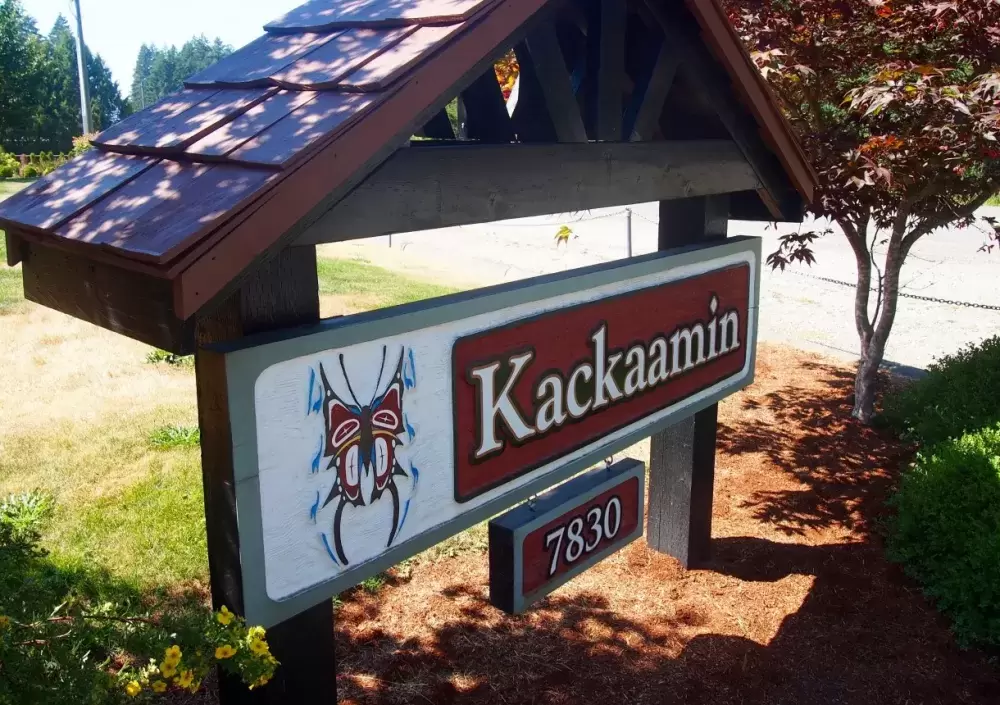A medical marijuana production facility proposed in the upper Alberni Valley is raising concerns among neighbours, most notably a First Nations drug and alcohol treatment centre located directly across the highway.
The proponent of the facility at 7827 Beaver Creek Rd. has been granted a building permit from Alberni-Clayoquot Regional District but has not yet obtained an operating licence from Health Canada.
Sadie Greenaway, executive director of Kackaamin Family Development Centre (KFDC), said she learned of the proposed growing facility about six months ago. Greenaway believes that marijuana production is incompatible with the centre’s programming, which includes child and youth services in addition to substance abuse counselling.
“Here we are across the road, we’re an alcohol and drug treatment centre,” Greenaway said. “Even though it’s rural, we’re in a rural residential area.”
Founded in the 1970s, KFDC has operated at the Beaver Creek location for almost a decade. Kackaamin (pronounced “cots-common,”) is a Nuu-chah-nulth word meaning “butterfly” or “transformation.” Primary funders include Island Health Authority, First Nations Health Authority, the Ministry of Children and Family Development and School District 70.
Greenaway is aware of strict regulations governing medical marijuana facilities and that there would be no retail activity at the plant. However, she knows little else about the proposal and has been unable to learn more through the regional district.
“We’ve asked for a meeting, but they haven’t got back to us yet,” she said. “I realize what they’re doing … it’s just in the wrong place. The neighbours may be 100 feet away, but it’s too close to everybody.”
She has additional concerns about the plant’s impact on Beaver Creek’s water supply. Potential noise and odour are also concerning.
“Beaver Creek is always on water rationing,” she said. “It’s a big concern around the water supply.”
John McNabb, ACRD area director for Beaver Creek, said he, too, knows little about the proposal. He expressed frustration over a federally administered process that provides no local or regional input.
“Our ability to change the course of that is very limited,” McNabb said. “We really don’t have the tools to work with. It’s really handcuffed us.”
Medical marijuana facilities in B.C. are restricted to lands contained in the province’s agricultural land reserve (ALR), he explained.
“As long as the site has agricultural zoning, then it’s out of our hands,” McNabb said.
The regional district won’t divulge the name of the proponent at this preliminary stage in the process, said Mike Irg, ACRD manager of planning and development.
With cannabis legalization set to take effect Oct. 17, the ACRD has revised its bylaw applicable to medical marijuana facilities, extending terms to include non-medical production, Irg noted. The bylaw will mirror what was enacted in 2014 for medical cannabis production with a minimum parcel size of 1.6 to 2.4 hectares (four to six acres) and a 30-metre (100-foot) setback minimum, he said.
An open house on Thursday, Aug. 16, 4-7 p.m. at the ACRD offices in Port Alberni is intended to gather feedback and provide information on the regulations.
Prior to adoption of the revised bylaw by the ACRD board, a public hearing will be held sometime in September, Irg said.
MP Gord Johns said feedback from neighbouring residents and businesses should be taken into account in the location of cannabis growing operations. Johns said he’s meeting with the ACRD to gain a better understanding of local concerns.
“Certainly, multiple medical licences, in some circumstances, should be considered commercial and thus require local government approval,” Johns noted in an emailed statement. “I will follow up on this issue in Ottawa with the appropriate authorities,” he added.
The medical marijuana industry has grown rapidly since 2014 legislation was enacted allowing private companies to apply for licences. Commercial investment has mushroomed in medical and non-medical sectors as cannabis legalization approaches. Alberta-based Atlas Growers, which recently acquired a company called Coastline Canada, has confirmed plans to build a medical marijuana facility in Courtenay. Another company, Alternabis Farms Ltd., is building a medical pot facility in the Cowichan Valley.
Pitt Meadows city council recently wrote to Premier John Horgan asking for a moratorium on marijuana production within the ALR until proper public consultations are held. The request does not apply to medical marijuana, which is grown indoors. Delta, Saanich and the Metro Vancouver board have made similar requests.
In July, the B.C. government granted municipalities and First Nations the authority to ban cannabis-production bunkers on ALR land. This is supposed to ensure that the land remains capable of supporting agriculture over the long term.







